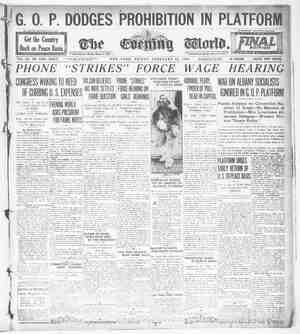New Britain Herald Newspaper, February 20, 1920, Page 9
You have reached the hourly page view limit. Unlock higher limit to our entire archive!
Subscribers enjoy higher page view limit, downloads, and exclusive features.
The Consumer Charge--Why? You, Mr. Consumer, Have a Staff of Men in the Electric Company’s Office Attending to Your Interests Selling public utility service is not the same as selling goods off the merchant’s shelves. The ordinary merchant sells a commodity only. He is under no obligation to his customers beyond insuring satisfaction in each particular sale. He can change his prices as often as he pleases. He can close his store when he desires. The Electric Company sells a commodity plus a service. It is obliged to be constantly vigilant and active in the interest of its consumers. It must be fair in its service, not only to each consumer but to all consumers alike. Because common logic and, indeed, legal consideration, dictate that there shall be no discrimination. The Electric Company is the servant of its consumers—not a few, but all. . And its consumers—all of them—are charged with the duty of paying it a fair return for its service. That’s reciprocity. The company has one group of employes—one division of expense—active in the sale of its product and appliances. It has another group of employes—another division of expense—for the purpose of providing service to its consumers apart from sales. These employes are: METER READERS, who must call upon all our consumers periodically and take time to read their meters accurately, record the consumption, if any, and bring the record back to the office. BILL CLERKS, who must take the meter readings, compare them with the previous readings, compute the amounts due, enter them on the bills, address the bills and place them in the mail. CASHIERS, bookkeepers and many clerks, who must be ready to receive pay- ments on bills, render receipts and see that the proper bookkeeping and other rec- ords are kept. INSPECTORS, who must at times visit the properties of consumers and see that the wiring, meter, lights and appliances are in good working order. THEN, TOO, there is the cost of postage stamps, stationery and record forms necessary in connection with each consumer’s account; there is the large item of office expense, including rent angd other cxpenditures that must be incurred. Please note that these employes must be maintained, these expenses met, to take care of the needs of all our consumers—not merely those who use our current frequently or in large volume. You know what it costs to hire people and to make all kinds of purchases in these high-cost-of-living days. Well. you have a corps of employes engaged con- stantly in supplying electric service to you. If you had to pay them you would find it a vast bill. But, by co-operating with the other users of electricity, you have to pay only a trifling part of the expense. Not enough to consider, in ycur case, but in the aggregate it helps us to maintain an efficient office service staff for the ben- efit of you and all the other users of electricity. The “Consumer” charge of 50 cents per month is applied toward meeting in a measure our office expense. This, combined with the “Demand” charge of 4 cents per 100 square feet of space (for finished rooms) in your house, gives the “Service Charge” amount on your electric bill. It is a fair and equitable charge and is so acknowledged by those who have examined it. It does not mean that the small householder will have to pay more. Nor that the large householder or merchant will pay less. All depends. Many tenants of small properties are finding their bills reduced. Some who live in large houses are finding increases—they have not been making full use of their electric service, but we have gone to the expense of being ready to serve them te the maximum extent, and under the new rates they are bear- ing a share of this expense. ' The fair-minded consumer wishes to pay his own way. He does not want someone else to bear his share of the cost of a service instailed for him. The new rates are of distinct advantage to every consumer, big and little, because— After having met the “Consumer’”’ and “Demand” Charges you can enjey any amount of electric service for lighting and labor-saving “evices at about half the former price per kilowatt hour. To KNOW the “Service-Charge” Plan is to APPROVLE It THE CONNECTICUT LIGHT and POWER CO.







